7 reasons to VOTE NO on Prop CC
#TABORYes
#ThankGodForTABOR
#VoteNoOnPropCC
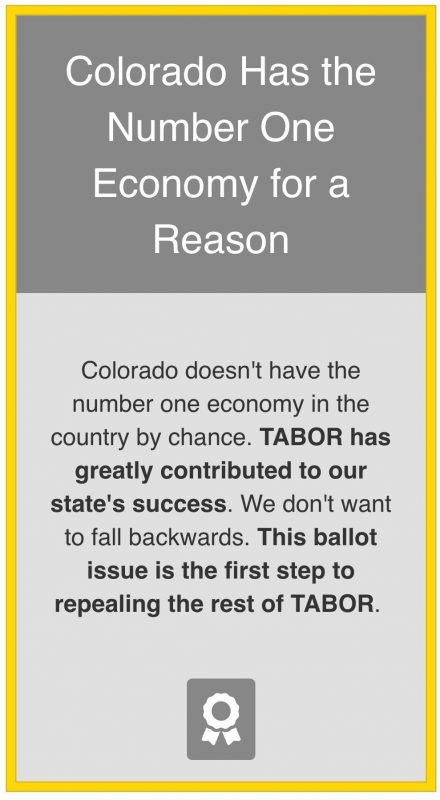
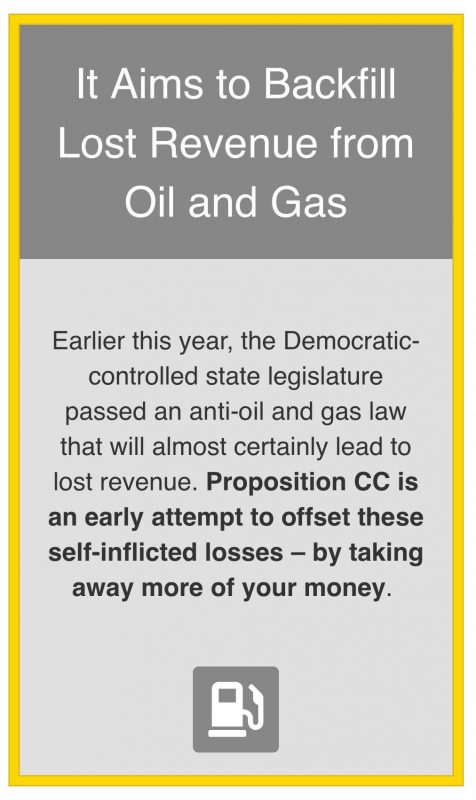
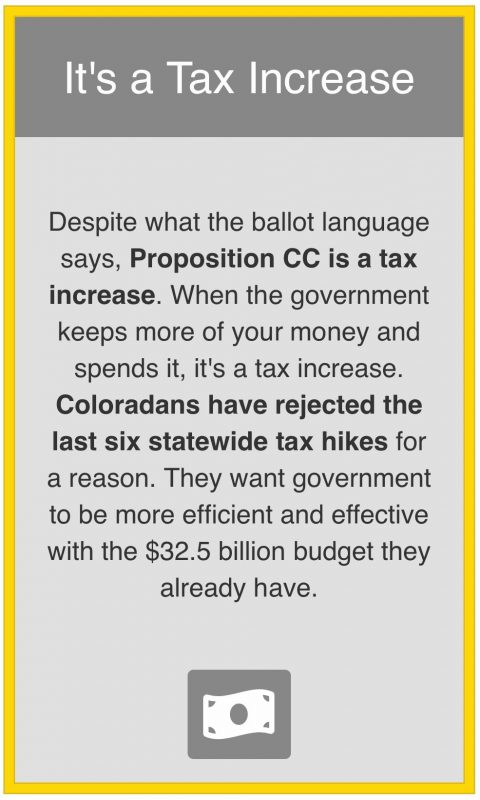
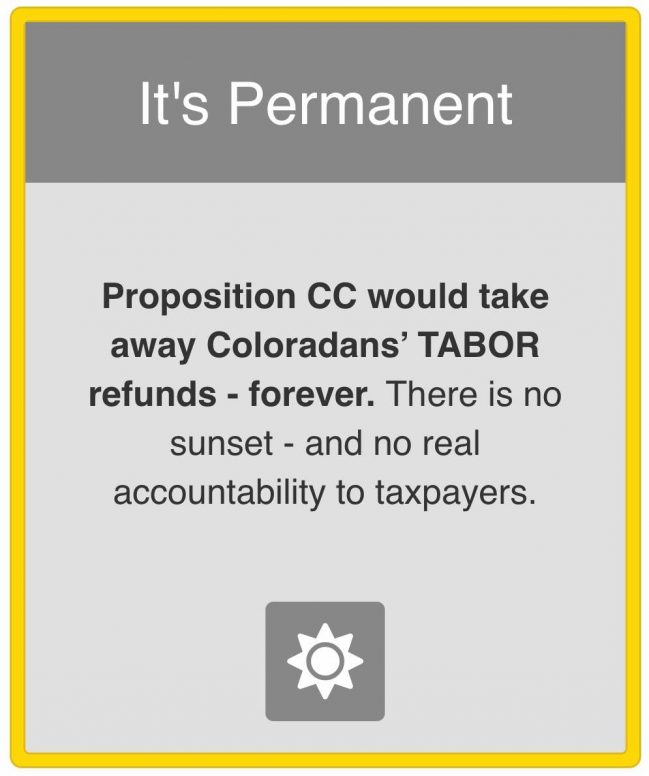
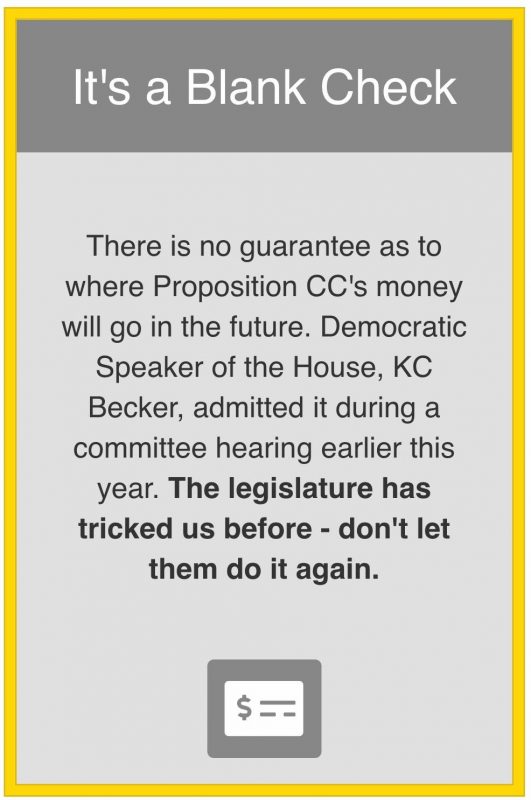

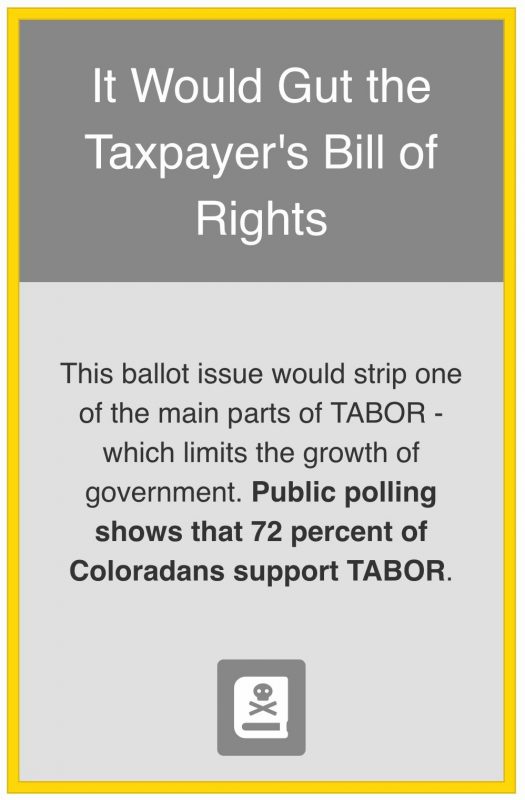
7 reasons to VOTE NO on Prop CC
#TABORYes
#ThankGodForTABOR
#VoteNoOnPropCC







Q&A with Penn Pfiffner | On standing up for freedom, and TABOR
· Dan Njegomir, Colorado Politics
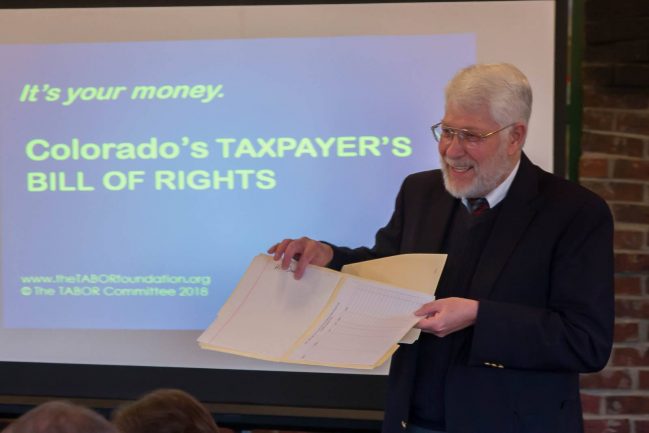
The TABOR Foundation’s Penn Pfiffner addresses the Reagan Club of Colorado earlier this year. (Photo courtesy the TABOR Foundation)
Even if you don’t move in Penn Pfiffner’s center-right political circles, you’re probably familiar with his name as the media’s go-to guy for comment on the Taxpayer’s Bill of Rights whenever it comes up in the news. And it comes up a lot, of course.
The groundbreaking taxing and spending limits — venerated by some and vilified by others — have been stirring debate ever since being enacted into Colorado’s Constitution by voters in 1992. Better known by its acronym TABOR, the constitutional provision has prompted lawsuits, legislation and more ballot issues by wide-ranging interests hoping to elude or at least ease its restraints on state and local budgets.
The perennial back-and-forth over TABOR also spawned the TABOR Foundation, which, along with its advocacy counterpart the TABOR Committee, emerged with the help of Pfiffner and other resolute TABOR supporters to stand up for the policy.
Pfiffner, who served as a Republican state representative from Lakewood in the 1990s, has become as distinctive a voice for TABOR over the years as he has for the advocacy of limited government in general.
He expounds on both of those endeavors and more — as always, in his characteristically eloquent and respectful way — in today’s Q&A.
Colorado Politics: Let’s start with a recent headline. The state Supreme Court ruled June 17 that a pending ballot proposal to repeal TABOR in its entirety may proceed — despite a constitutional “single-subject” stipulation on ballot issues that was long believed to have blocked precisely such an all-in-one-shot repeal.
In a public statement from the TABOR Foundation condemning the ruling, you said, “The court has become dangerously unmoored from the clear meaning of the state constitution.” The statement also said the court ”appears to take sides.”
Recap for us what was fundamentally at issue in the case before court — and why you feel the court missed the mark.
Penn Pfiffner: The recent direction of the Colorado courts on constitutional matters should trouble any citizen. Our American system relies on an honest judicial branch to impartially interpret the law. We have seen an absolutely consistent antipathy from the courts towards the Taxpayer’s Bill of Rights.
It’s an understatement to say that the justices from trial level to the Colorado Supreme Court have appeared to argue backwards from predetermined outcomes. Some of the arguments appeared to me to be even juvenile, like an adolescent trying too hard to argue the impossible.
The central finding in the Bridge Enterprise case that the TABOR Foundation brought is an example. Years from now, I surmise historians of Colorado’s system will be amazed and disgusted that it became so partisan during these recent years. Good, experienced attorneys today are urging the TABOR Foundation not to bring any more constitutional issues to the judicial branch — it’s that futile, and all that we end up with is setting bad precedent. In the case you raise, the court explicitly threw out a generation of precedent. It’s as if they never opened the section on TABOR to read all the different pieces in this comprehensive constitutional measure.
A dissent from the bench pointed out that some activist could now substitute Colorado’s extensive “Bill of Rights” for “Taxpayer’s Bill of Rights” (in a ballot proposal) and in one vote overturn all citizen protections. A leftist court looks ready to use its personal political views to put a thumb on the scales of justice.
Penn Pfiffner
CP: Give us your elevator speech on TABOR’s role, and value, in our state constitution.
To read the rest of this story, click (HERE):

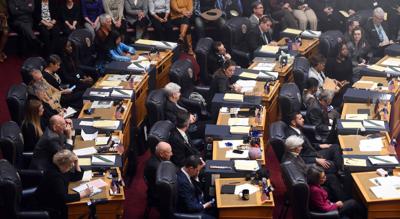
Prop CC, referred to the ballot by the 2019 Legislature, would gut the Taxpayer’s Bill of Rights. Surveys show TABOR, passed by voters in 1992, is more popular than ever.
Taxpayers like TABOR because voters do not trust politicians on either side of the aisle. They are tired of legislators passing laws that counter their will, such as jobs-killing regulations of oil and gas that voters rejected on the ballot. They are tired of state officials acting broke while the economy generates mountains of surplus cash.

DENVER, CO – MAY 3: Governor Jared Polis speaks during a press conference to tout the accomplishments of the Colorado General Assembly on last day of the regular assembly, May 3, 2019, in Denver, Colorado. (Photo by Joe Amon/MediaNews Group/The
DENVER POST VIA GETTY IMAGES
Colorado Governor Jared Polis (D) welcomed conservative economist Art Laffer to the state capitol in Denver today to help gin up Republican support for a potential deal intended to avert taxpayer refunds projected to be sent to Colorado taxpayers in the coming year, with Polis’ ultimate goal being the wounding of the nation’s strongest taxpayer protection measure so that it remains in effect in name only, not in practice.
Colorado’s Taxpayer Bill of Rights (TABOR), approved by voters in 1992 as an amendment to the state constitution, is the sturdiest taxpayer safeguard in the nation. Under TABOR, state revenue cannot grow faster than the combined rate of population growth and inflation.
Any state revenue collected in excess of the TABOR cap must be refunded to taxpayers. Thanks to healthy state revenue collections coming in above the cap allowed by Colorado’s Taxpayer Bill of Rights, current projections show the state will have to refund roughly $500 million to Colorado taxpayers next year. That won’t happen if Proposition CC, a measure ending TABOR refunds, is rejected by Colorado voters this November.
Don’t mess with TABOR.
TABOR protects you from Tax & Spend politicians.
Vote NO on Proposition CC in November and NO on repealing TABOR in November 2020.
Don’t lose your rights!
The network is called Vision 2020, and so far it includes the Bell Policy Center and Colorado Fiscal Institute, and Great Education Colorado, among others.
The network recently praised a Colorado Supreme Court ruling that said a proposed measure to repeal TABOR outright doesn’t violate the state constitution’s single-subject requirement. The ruling means TABOR, passed by voters in 1992, could be repealed with one vote.
Proponents of repeal would still need to collect signatures to get the question on the ballot for 2020.


In this file photo, volunteers pile up signs for backers of the 2005 ballot measures that aimed to lift some TABOR restrictions. Referendum C passed which allowed the state to retain expected refunds for five years and reset the TABOR base.
By JON CALDARA | Columnist for The Denver Post
PUBLISHED: June 28, 2019 at 2:14 pm
Come on you taxpayer-hating, consent-loathing, voter-fearing pantywaists.
Cowboy up and put a full repeal of our Taxpayer’s Bill of Rights on the ballot. You know you want to. So just do it.
I’m talking to you in the Colorado Legislature who’ve been calling tax increases “fees” because you don’t trust the people who elected you to vote on their own taxes. You who want another “TABOR time out” to nibble away consent and jack up spending limits permanently.
You’ve always hated TABOR because you hate asking for permission to raise taxes. You hate asking to raise debt. You hate asking to keep excess tax revenue above the rate of population growth and inflation.
You’ve used every conceivable loophole the courts have pried open for you to keep what would have been refunded to working families.
And now you never want to have to ask again.